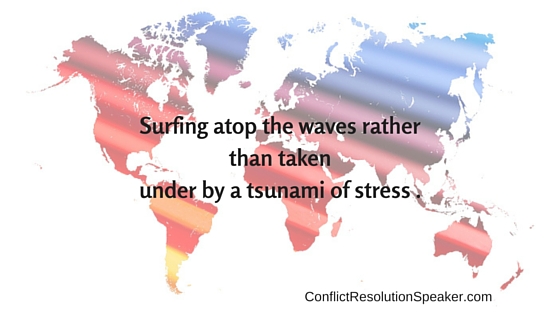 Have you ever completely “lost it” in an argument? You are not alone; however, it is important to understand the health of escalated tempers and how it can impact longevity and your quality of life.
Have you ever completely “lost it” in an argument? You are not alone; however, it is important to understand the health of escalated tempers and how it can impact longevity and your quality of life.
It is no secret that anger is an explosive emotion. It has physical impacts and can lead to regrettable actions, words and severed ties. As a general rule, we all learn coping mechanisms. I recall in the 70’s there was a campaign to “take 10.” The concept was to stop and count to ten before “reacting in anger or rage.”
Many people choose to either “move out” or “move on” from a situation, as if this is a healthy resolution. From one perspective, it may “seem” to be a solution; however, denying the ultimate need of external conflict can lead to a residual impact for the individuals involved. This comes down to inner conflict. According to a recent study conducted by Berkley and Stanford, there are long term effects of stress that impact health. It is time to reassess how we value “conflict resolution.” If the thought is that it’s “too hard” or “not worth it,” consider the personal benefits, the greatest of which is the quality of personal health.
Emotions are fascinating indicators we can easily misinterpret or dismiss without consideration of how a body “speaks” non-verbally. Whether you are highly in tune with your body or not, there are things it does to let you know something needs attention. All too often we press on and dismiss what could help deter something down the road.
Although there are many emotions that impact stress and physical health, I will use anger as an example, as it is something many deal with often. It acts as an internal “Danger or Warning” signal, much like those sometimes ignored in a car.
Consider anger like that warning light. When anger escalates, it is the body’s warning indicating that something needs to change. This emotion communicates through physical outbursts or responses that need attention. When internal anger is triggered, it can become external anger, which becomes physical. The problem is that we focus on the emotion or what triggered it without consideration of how such neglect impacts beyond just that moment.
A body’s non-verbal communication often shrieks a “cry for help,” as emotions contribute to the release of intense levels of various proteins and enzymes. Internally, the operating system is ignited to toxic overload. Powerful and unresolved “feelings” like anger very likely contribute to increased blood pressure, rapid heartbeat or increased adrenaline. As creatures of habit, we may not learn the value of listening to our body. It behooves us to learn conflict resolution skills
When we come to value the benefit of long term health from this perspective, perhaps we’ll realize that investment into better communication and conflict resolutions skills are worth the benefit of longevity and better health. The benefits include human dynamics and interaction that benefit families and the community at large.
The Huffington Post revealed how health is connected to how we handle conflict. There are implication to life span and quality of life. Health and quality of life is a personal choice. For more on anger management stay connected.
©2016 Veronica Sites

Leave a Reply